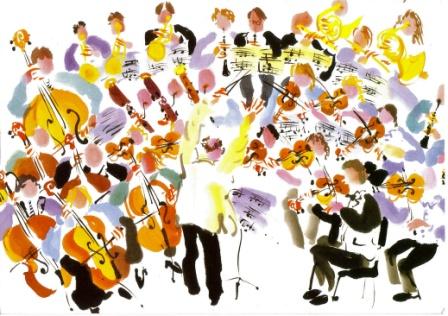The improving orchestra
|
| Why
are older people more forgetful than younger ones? Many scientists are
inclined to answer: for pathological reasons. I don't share this
opinion, at least not for the major part of older people. It is not
just a question of loss of synapses, shrinkage of neuronal tissue, and
retraction of neuritic extensions. It is also a natural consequence of
accumulating meaningful information over very long periods of time. |
| Just
try to estimate the amount of data we are confronted with, day after
day. Each day has 86.400 seconds. At least during our sleep our brain
is shielded from the unabating influx of new information, but roughly
60.000 seconds remain. During a life of roughly 45 years duration, our
multiple sensory channels have been exposed for 1 billion seconds to
high resolution images and broad frequency sounds. Where did all this
material go? |
| Theoretically,
all this information could have gone all the way from our sensory
organs to
the primary receptive areas in the brain and from there to long-term
storage networks in our large cerebral association cortices.
Fortunately, this did not happen. The more experienced we got, the more
we learned to pay attention to the relevant signals and to
ignore the rest. Nevertheless, even by this strategic trick, our
association cortices got loaded with increasing amounts of information. |
| What
happens to this information? Is it just silently sitting there, just
waiting for the right moment to come?
Of course not. That would be a waste of storage capacity. It is on the
contrary actively participating in various thought
processes, concerning events that apparently have nothing to do
with the original
event that, a long time ago, was the first reason to set up this memory
trace. Our memory traces are always in motion, reverberating curiously
with each other and with new impressions. |
| Over
the years, the symphony orchestra in our brain gets larger and better.
More and more memory is accumulated, and if we are doing well and
succeed in making sense of all this stuff, it soon makes more sense
to listen to our inner voice than to follow each new external
impression. That's when our "forgetfulness" sets in. Our inner voice
gets more important than new information from outside. Again, we pay
more attention to the relevant thoughts (coming from inside ourselves)
and ignore most of the rest. |
| The
increasing forgetfulness of older people is the consequence of having
come to final solutions in multiple long-term thought processes. New
material is then often neglected either because it is recognized as
irrelevant and meaningless, or because it is allready known very well.
If something new appears on the scene that helps to improve the whole
complex construction, it is memorized very well, becoming an integral
part of our inner orchestra. |
3/12 < MB
(6/12) > 6/12
|
